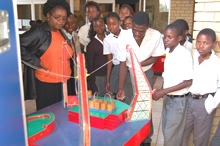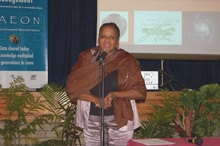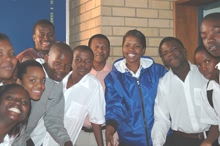National Science Week a roaring success
|
Editorial by Sibongile Mokoena, Joe Sibiya & Dr Dave Balfour.
National Science Week 2006 (NSW06) in Ba-Phalaborwa was even bigger and better than last year. The SAEON Ndlovu Node and Palabora Foundation jointly hosted the event in Lulekani, a township within the Ba-Phalaborwa district.
Grade 6-11 learners from 47 schools in local villages, townships and suburbs of Ba-Phalaborwa attended the programme. The total participation was 2 860 learners and 120 teachers. It is no small achievement that NSW06 attracted town and township schools in the area.
Preparing for the event
The Department of Science and Technology (DST) annually provides funding for the NSW programmes, and the fund is managed by the South African Agency for Science and Technology Advancement (SAASTA). Based on the success of SAEON’s NSW programme in 2005, the amount of R52 000 that was awarded for the programme in 2005 was increased to R108 000 for 2006.
Once the grant was confirmed, work began. A programme was structured, and presenters and exhibitors were identified. Communicating with 50 schools, many of which do not have telephones, was an arduous yet crucial task. A roster was drawn up and information circulated to all the schools. Buses were hired to transport between 50 and 60 learners from each school to and from the venue on the day. The organising committee worked tirelessly to ensure that all arrangements ran smoothly.
Field trips
The programme for the week was tightly packed with a range of activities. Grade 9 to 11 learners were taken on field trips to different organisations. Letaba Camp in the Kruger National Park provided hands-on experience in biodiversity conservation, whilst other groups went to Sasol-Nitro and Foskor for insight into the mining industry. A total of 585 learners and 27 teachers were taken on field trips.
Exhibitions
Learners had the opportunity to interact with scientists and science-related organisations during the entire week. It was encouraging to see learners of all grades absorbed in the displays, asking questions, and interfacing with the exhibitors - the Hoedspruit Endangered Species Centre (HESC), Department of Water Affairs and Forestry and their Working for Water division, SA Air Force – Hoedspruit, SA Weather Services, SAASTA with SciQuest (a hands-on set of interactive science puzzles).
Presentations
Scientists and other presenters gave talks on a wide range of topics. The aim was to expose and inform learners about a broad spectrum of sciences to enable them to make informed choices about careers in the sciences.
Presenters for the week included senior and emerging scientists as role models, such as Dr Dave Balfour (SAEON), Dr Danny Govender (KNP), Dr Peter Buss (KNP), Dr Andrew Deacon (KNP) and Dr Rob Toms & his team (Transvaal Museum).
Public outreach
Four evening lectures aimed at increasing public understanding of science were presented during NWS06. It was encouraging that 70 people voluntarily attended the evening lectures.
The highlight of the community lectures was a PowerPoint presentation by Bekisa Zitha, a local potter. Joe Sibiya, Education Facilitator at SAEON Ndlovu Node took pictures of the entire process from identifying and digging for the clay, to moulding, shaping and finally decorating and firing the pots to produce the final product. There was a great sense of satisfaction in being able to provide an empowering experience to a rural woman by combining modern technology and indigenous knowledge on a national science platform.
Lulekani Fun Run
A Fun Run was organised on the Saturday preceding the week’s activities as part of the publicity drive for NSW, as well as to promote the healthy body/healthy mind ideal. About 50 people participated. Winners in all classes were presented with engraved trophies at a formal prize-giving ceremony.
As part of a growing tradition, the winner from last year’s fun run in Namakgale participated in Lulekani this year. Unfortunately for him, the residents of Lulekani mounted sufficient competition and managed to beat him into second place.
Based on the success of SAEON's National Science Week programme in 2005, the funds awarded for the programme in 2005 were more than doubled in 2006.
Partnerships
In the preparations for NSW06, new partnerships were forged and existing ones strengthened. The value and impact of contributions in kind by the eighteen participating organisations and the professionals who gave of their time to be part of NSW06 cannot be underestimated.
SAEON would like to thank the Kruger National Park, Transvaal Museum, SAASTA, Hoedspruit Endangered Species Centre, Department of Water Affairs and Forestry (Limpopo Province), SA Air Force – Hoedspruit, SA Weather Services, Department of Education, SADTU, Palabora Foundation, Ba-Phalaborwa Municipality, Coca-Cola, Sefapane Lodge, Foskor, Sasol Nitro, Limpopo Provincial Government, and University of Limpopo for their valuable support and assistance.
Closing ceremony
The highlight of the week’s programme was the closing ceremony on Saturday 20 May, which was attended by officials from Limpopo provincial government, local government, school principals and teachers, selected learners, NGO’s and members of the public.
In her keynote address, Mrs Dikeledi Magadzi, MEC for the Limpopo Department of Agriculture, highlighted the significant role played by women in subsistence livelihoods. She emphasised the need for capacity building by providing knowledge and understanding of the link between sustainable livelihoods and sustainable use of natural resources.
Ms Gloria Valoyi, the Mayor of Ba-Phalaborwa said that the city council appreciated the fact that NSW06 had put Phalaborwa on such an important national platform.
Tibello Maguga-Phasha, a microbiologist in Health Sciences at the University of Limpopo, took the science platform. In her presentation she demonstrated to a non-scientist audience how a virus attacks the immune system, with special emphasis on HIV and malaria. This led to active engagement on the part of the audience, an indication that people appreciate information about issues that affect them directly, such as HIV and malaria.
The ceremony included entertainment in the form of an educational drama by Vuxeni High School and a routine by the Makwaya traditional dancers. The choral verse by Mhalamhala Primary School on ‘Women in Science’ raised emotions and the MEC requested the girls to take the stage a second time.
Conclusion
The success of the week strongly hinged on the fact that there was such strong support for the aims and objectives of the week by the SAEON partners, the presenters and local educators.
From the feedback received from the high-level speakers and guests, SAEON partners, educators, learners and members of the public, the event can definitely be rated as one of the highlights on the Ba-Phalaborwa calendar.
A clear indication of its success was when guests such as Mrs Dikeledi Magadzi, MEC for the Limpopo Department of Agriculture, requested to be invited again next year.
For further information, send an email to sibongile@saeon.ac.za or joe@saeon.ac.za .














